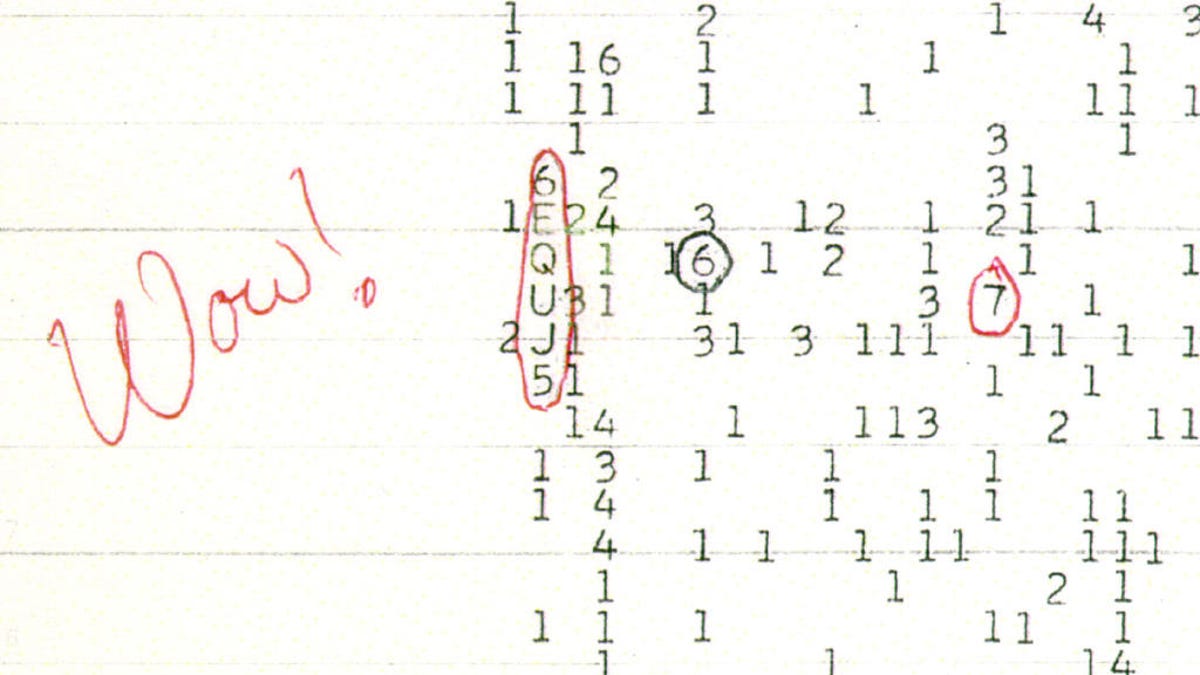Aliens could still explain the 'Wow signal,' scientists say
This month an astronomer claimed to have debunked a mysterious 1977 radio signal from deep space, but other scientists aren't buying his theory.
A story circulating this month suggests the 40-year-old mystery of the so-called Wow! signal from space has been solved, but a number of scientists aren't convinced.
The Wow signal was a one-time blip picked up by Ohio State University's "Big Ear" radio telescope in 1977 that appeared to be of extraterrestrial origin -- so much so that astronomer Jerry R. Ehman wrote "Wow!" on a printout of the data. Others have tried to pick up the signal again over the ensuing decades without luck, allowing the mystery to endure.
A number of possible explanations, including a star or even aliens, have been proposed over the years without eliciting much consensus among scientists. The latest comes from Antonio Paris, an adjunct professor at Florida's St. Petersburg College, who proposes in a new paper that the Wow signal came not from aliens, but from comets.
Paris' basic proposal is that the clouds of hydrogen emitted by two comets that were in the neighborhood "are strong candidates for the source of the 1977 'Wow' signal." You can dig deeper into the research by checking out the full paper (PDF link).
This hypothesis doesn't sit well with a number of scientists, however.
Yvette Cendes, a radio astronomer and Ph.D. candidate at the University of Toronto, confirmed to me that she's not at all convinced by Paris' paper and cometary explanation for the odd signal. She wrote a detailed takedown of the comet hypothesis on Reddit that's now beginning to work its way around the internet as well.
Cendes raises a tentative eyebrow at Paris' credentials and the obscure journal that published his paper, the Journal of the Washington Academy of Sciences, before moving on to the study itself.
"This paper was also just really, really, really short on details that a radio astronomer would want, to the point where it likely wouldn't have passed a referee at a 'regular' journal," she writes, before going on to suggest the signal Paris picked up may have actually come from our sun rather than comets.
"The comet hypothesis, in my opinion, doesn't work," Seth Shostak of the SETI Institute concurred in a blog post. Shostak cites the comments of Robert Dixon, who was director of the Ohio State observatory back in 1977. "Dixon (says) the comets were nowhere near the telescope's sight lines when the signal was found."
Oxford physics professor Chris Lintott was so put off by the comet hypothesis that he compiled a list of questions for Paris about his work. Paris responded that he plans to review them and respond as soon as he's done with a current round of traveling.
Now we are talking! Something that should have been sent on day one. Will respond when possible ... traveling at the moment.
— Prof. Antonio Paris (@AntonioParis) June 12, 2017
Meanwhile, the search for a second occurence of the Wow signal anomaly continues. Shostak says the SETI Institute's Allen Telescope Array keeps listening.
"So yes, it's possible (but unproven) that the Wow signal was the result of aliens sending a short ping. If so, we may someday pick up their transmissions again. But it wasn't a comet … which should be the end of that tale."
Technically Literate: Original works of short fiction with unique perspectives on tech, exclusively on CNET.
Crowd Control: A crowdsourced science fiction novel written by CNET readers.


